
Choosing the right chat platform is critical for modern businesses. This comprehensive guide compares the best chat platforms for team communication, customer support, and personal messaging. Learn about Rocket.Chat, Slack, Intercom, WhatsApp, and other leading solutions.
Discover essential features like security, scalability, integrations, and compliance support. With 80% of workers now using collaboration tools and the digital workplace market reaching $40 billion, selecting a secure, user-friendly platform impacts productivity, customer success, and business growth.
When organizations evaluate chat platforms for their teams, they're looking for more than just messaging capabilities. According to recent research on remote work collaboration, 60% of employees aged 18-34 report wasting time switching between collaboration tools, highlighting the critical need for unified communication solutions.
The digital workplace market reached $40 billion in 2023 and is projected to grow at a 22.3% compound annual growth rate, driven by increasing demand for seamless team collaboration. The European Union's Digital Markets Act now requires Big Tech gatekeepers to open their APIs for interoperability, meaning users will have more choice when selecting platforms based on standout features and security rather than market dominance alone.
This comprehensive guide explores the best chat platforms across three categories: workplace communication, customer support, and personal messaging. Discover how each solution stands out and which features matter most for your organization.
What is a chat platform?
A chat platform is software that enables real-time communication through text, voice, and video. However, conversations happen in different contexts: with coworkers, customers, friends, and family. When people refer to "chat platforms," they could mean workplace collaboration tools, customer support solutions, or consumer messaging apps.
Gartner research shows that 80% of workers now use collaboration tools for work, representing a 44% increase since 2019. This article examines three distinct categories of chat platforms to help you find the right solution for your needs.
Best chat platforms for team communication
Digital workplaces have become standard practice, with McKinsey reporting that 58% of Americans now have the option to work from home at least one day per week. Organizations need robust communication tools that bridge physical gaps between team members while maintaining productivity and security.
Modern workplace communication requires chat platforms that support:
- Real-time messaging and file sharing
- Video conferencing and screen sharing
- Integration with existing business tools
- Enterprise-grade security and compliance
- Scalability for growing teams
Here are five leading chat platforms for team communication:
Rocket.Chat
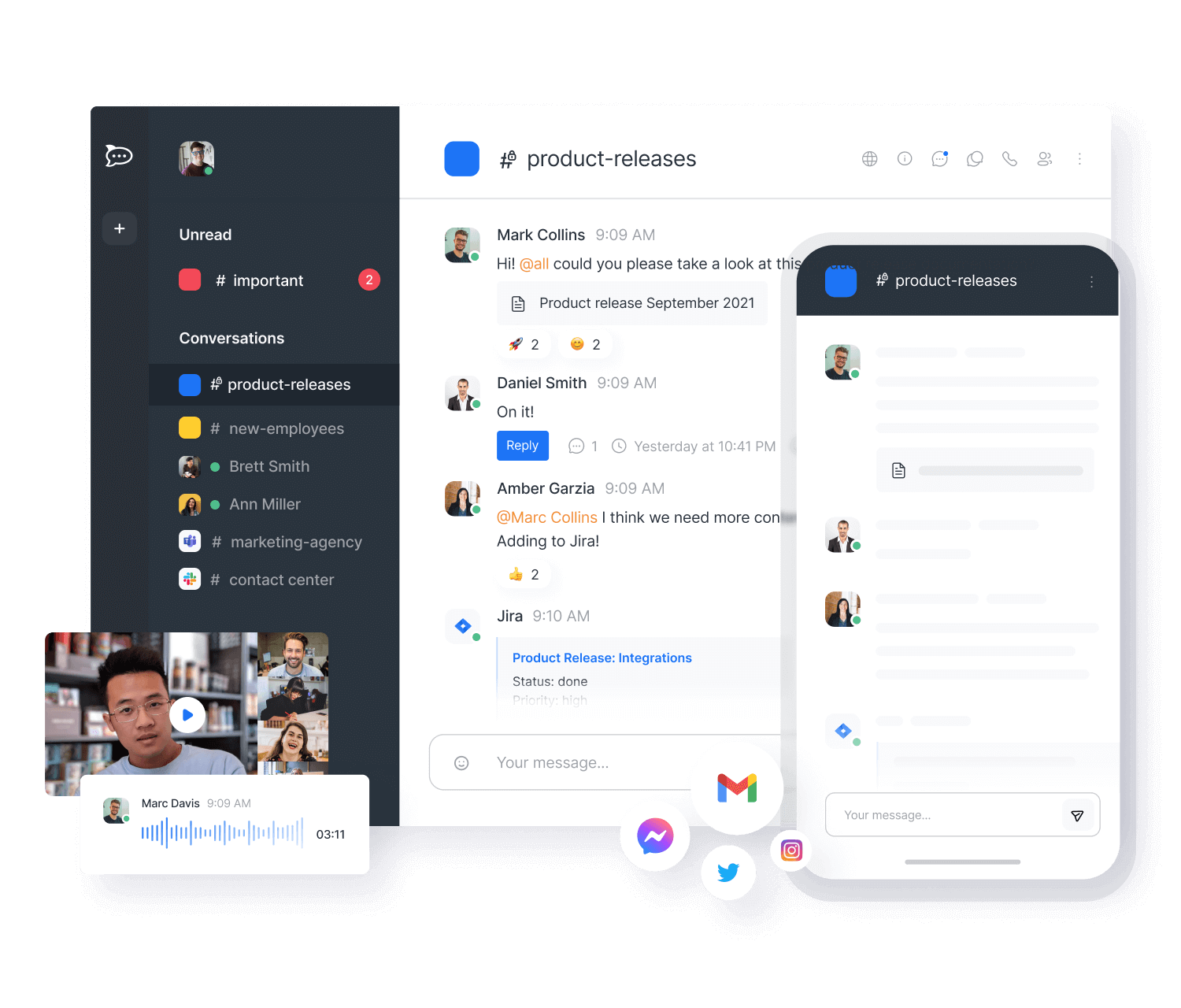
Rocket.Chat is a comprehensive team collaboration platform designed for organizations that prioritize security, customization, and control. This open-source solution serves multiple purposes beyond basic messaging.
Key capabilities include:
- Team collaboration: Real-time messaging, video conferencing, file sharing, and threaded conversations for hybrid workplaces
- Omnichannel customer service: Single team inbox consolidating communication from Instagram, Twitter, WhatsApp, and other channels
- In-app chat: Embedded chat functionality for products and services to support users throughout their journey
Rocket.Chat stands out among secure team chat solutions, making it particularly valuable for regulated industries like healthcare, education, and government. The platform offers end-to-end encryption, on-premises deployment options, and compliance support for HIPAA, GDPR, and FINRA.
Organizations seeking encrypted messaging apps for business will appreciate Rocket.Chat's focus on data sovereignty and customization capabilities.
Slack
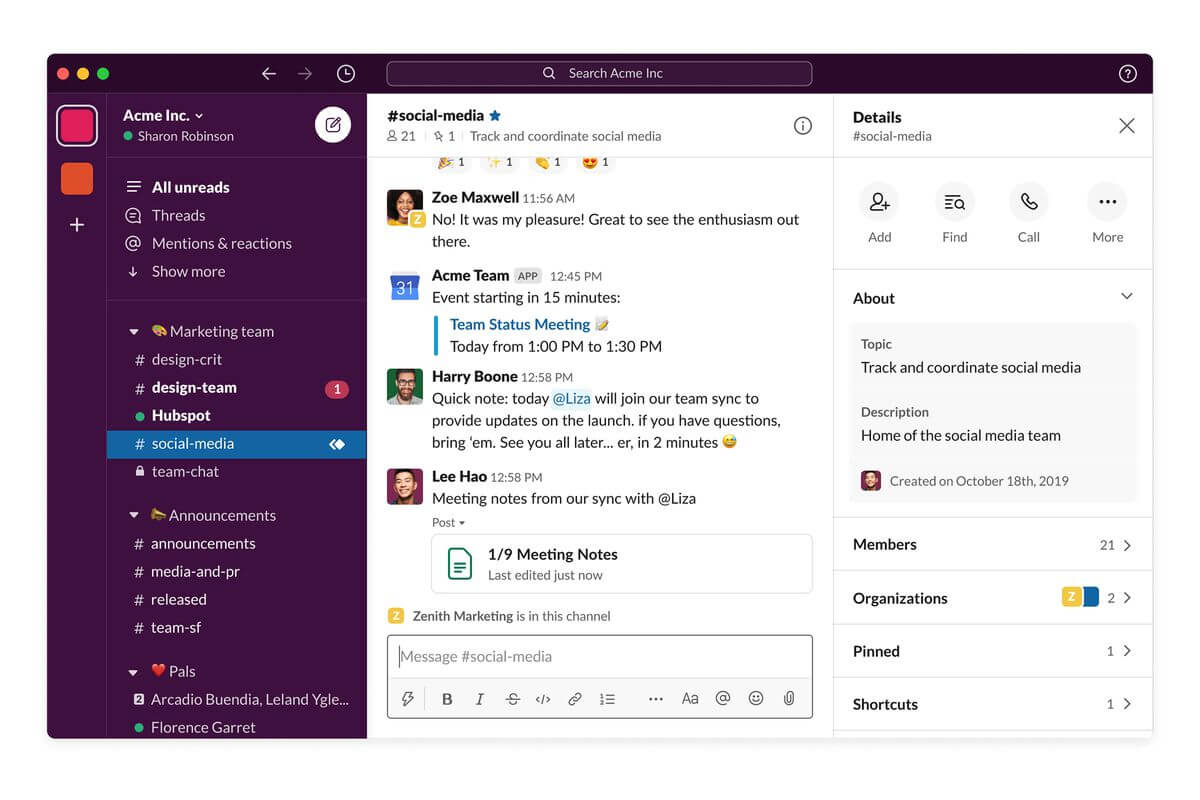
Slack dominates the workplace chat market as the most recognized collaboration platform. It successfully established itself as a new standard for workplace communication, though numerous alternatives now offer comparable functionality at lower costs.
As security becomes increasingly important, many organizations explore alternatives that provide organizational security features better suited to privacy-conscious businesses. European organizations increasingly explore alternatives to Slack and MS Teams due to compliance and security reasons.
Chanty
Chanty combines messaging with simple task management, making it useful for teams that want integrated collaboration platforms without complex features. The platform includes chat, calls, video conferencing, and basic project tracking in a single interface.
Ryver
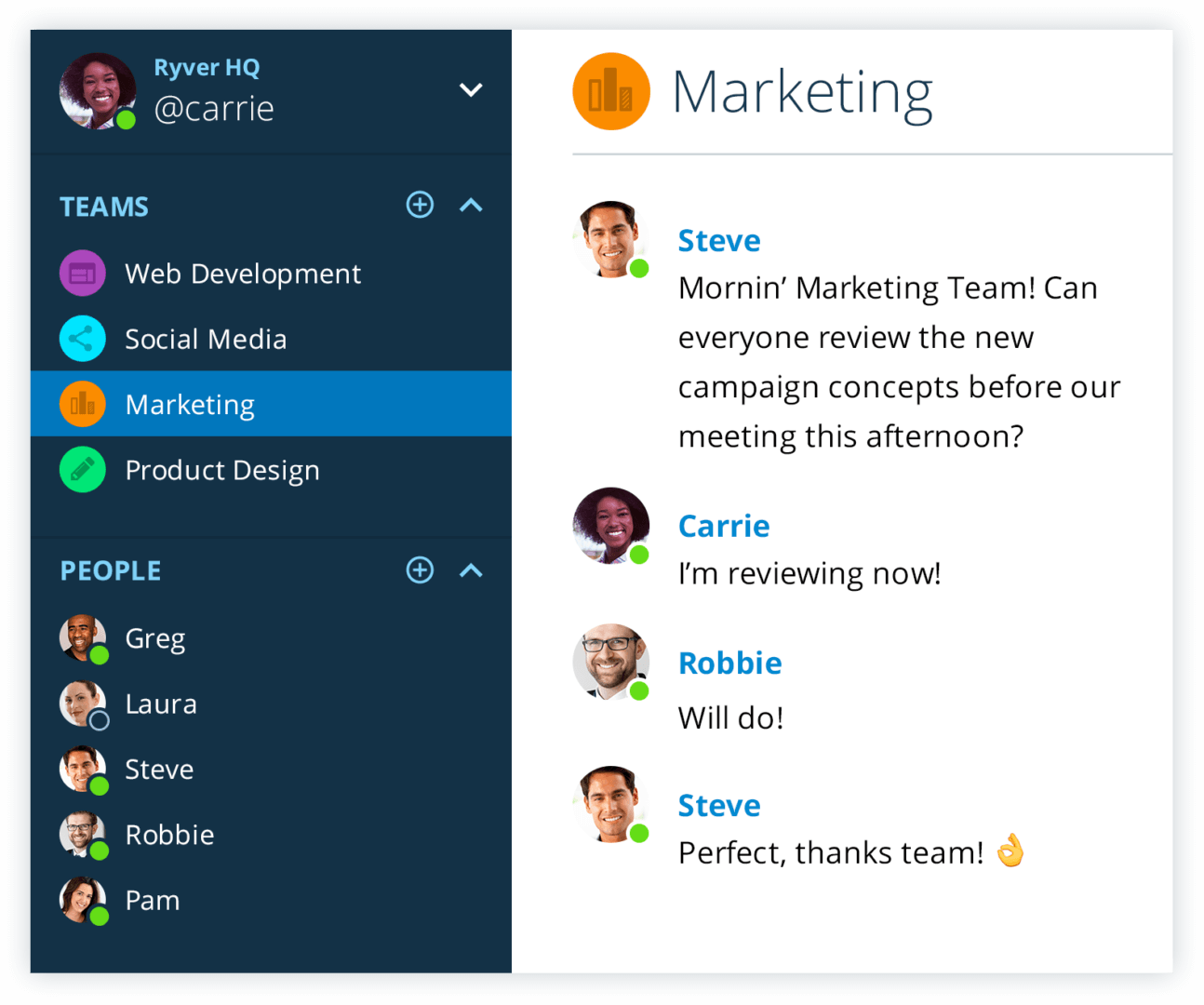
Ryver blends team chat with project management features, positioning itself as a hybrid between Slack and Trello. This instant messaging platform helps teams collaborate without switching between multiple tools, potentially increasing productivity.
Flock
Flock provides encrypted communication through instant messaging, video calls, and voice notes. The platform includes productivity features like to-dos, polls, and reminders, making it suitable for privacy-oriented organizations prioritizing communication security.
Additional resources:
- Team communication apps for hybrid teams
- Workplace team communication best practices
Best chat platforms for customer service
Customer support has evolved beyond phone and email. Chat has become essential for modern customer service, enabling quick resolution and meeting consumer expectations for instant communication.
Benefits of customer support chat platforms:
- Instant response capabilities
- Automation through chatbots
- Multi-channel support consolidation
- Reduced support costs
- Improved customer satisfaction
Here are five leading platforms for customer support:
Intercom
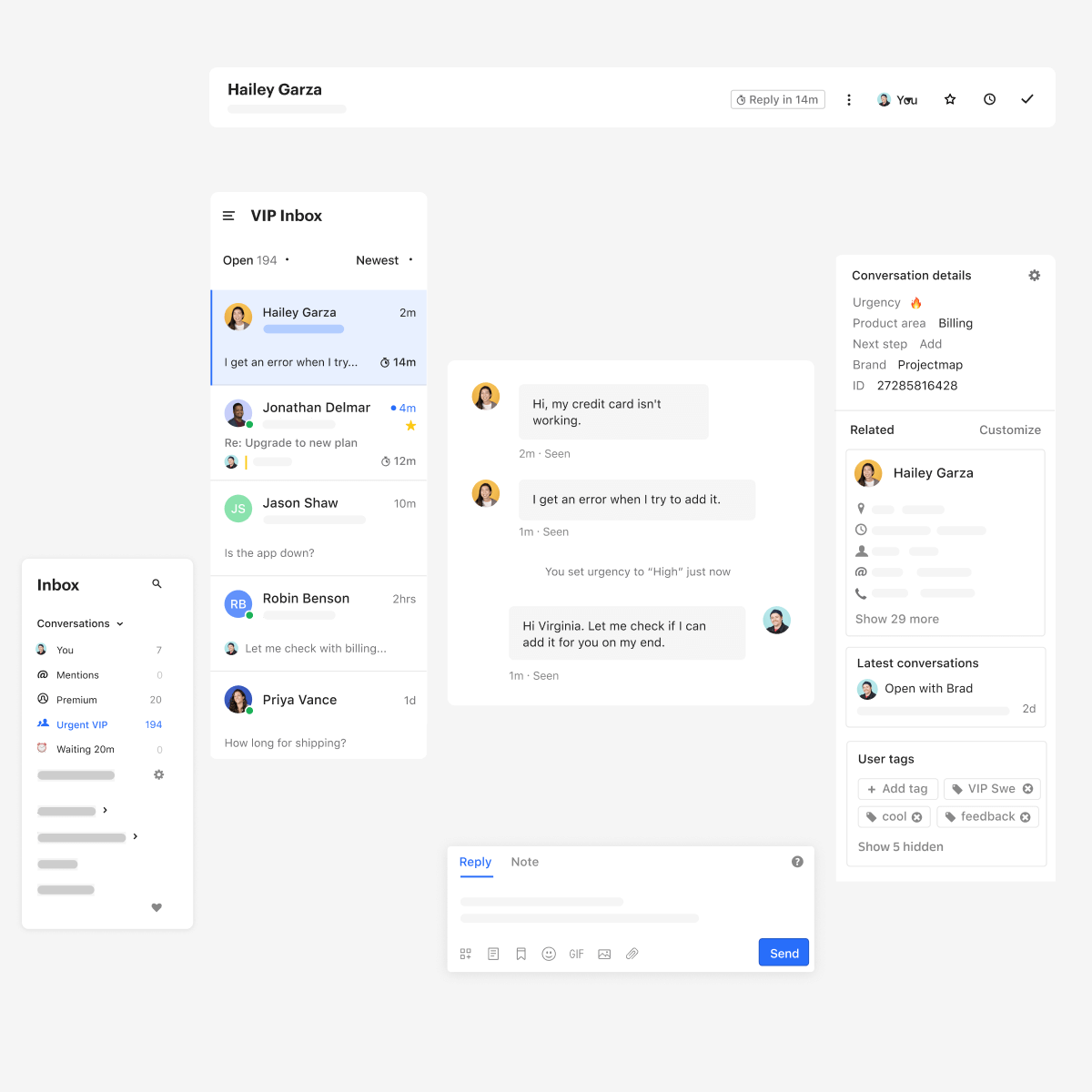
Intercom is the industry standard for live chat interaction with customers. Features include live chat, shared inbox, product tours, chatbots, and email marketing, supporting customers throughout their journey.
While popular and reliable, many businesses don't utilize all features, leading them to explore open-source alternatives offering focused functionality at lower costs.
Freshchat
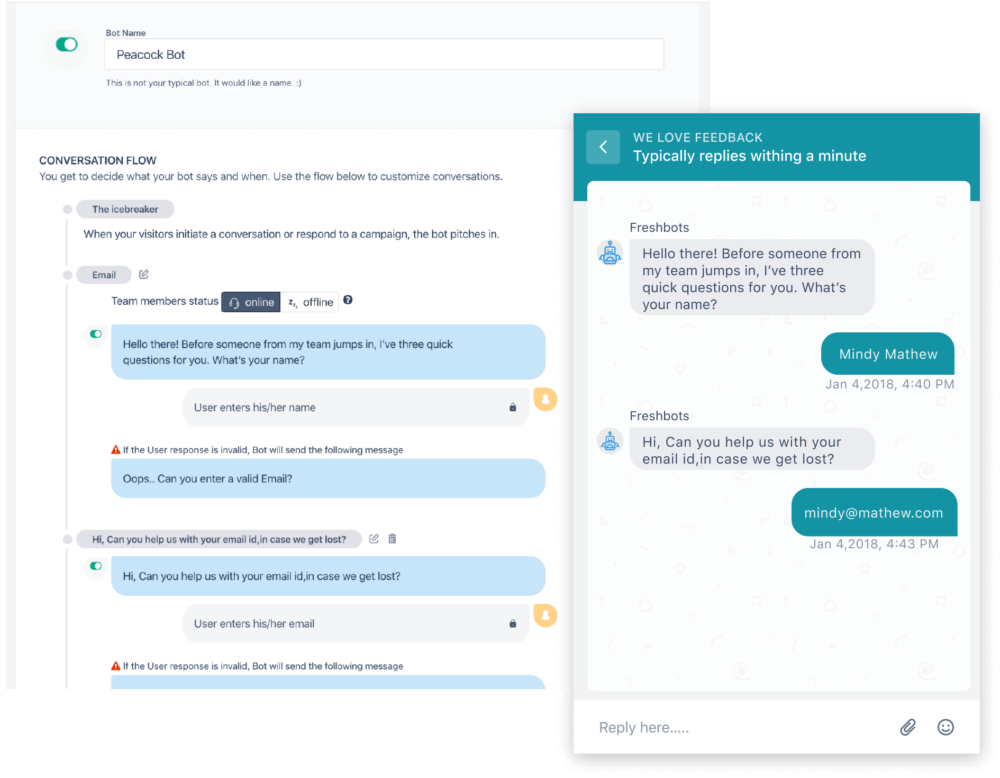
Freshchat provides conversational messaging for customer service across multiple channels. Customers can reach support agents via WhatsApp, Facebook Messenger, and other platforms. Chatbots and self-service capabilities enable instant feedback while allowing agents to proactively build customer trust.
Zoho Desk
Zoho Desk streamlines customer interactions from multiple channels into a single inbox. Social media integration allows customer service agents to respond to social posts and improve customer experience. The platform includes standard live chat functionality with embeddable widgets for proactive engagement.
Tidio
Tidio offers an all-in-one customer service solution combining live chat and AI chatbots. It's ideal for small and medium businesses wanting organized, automated communication in one place.
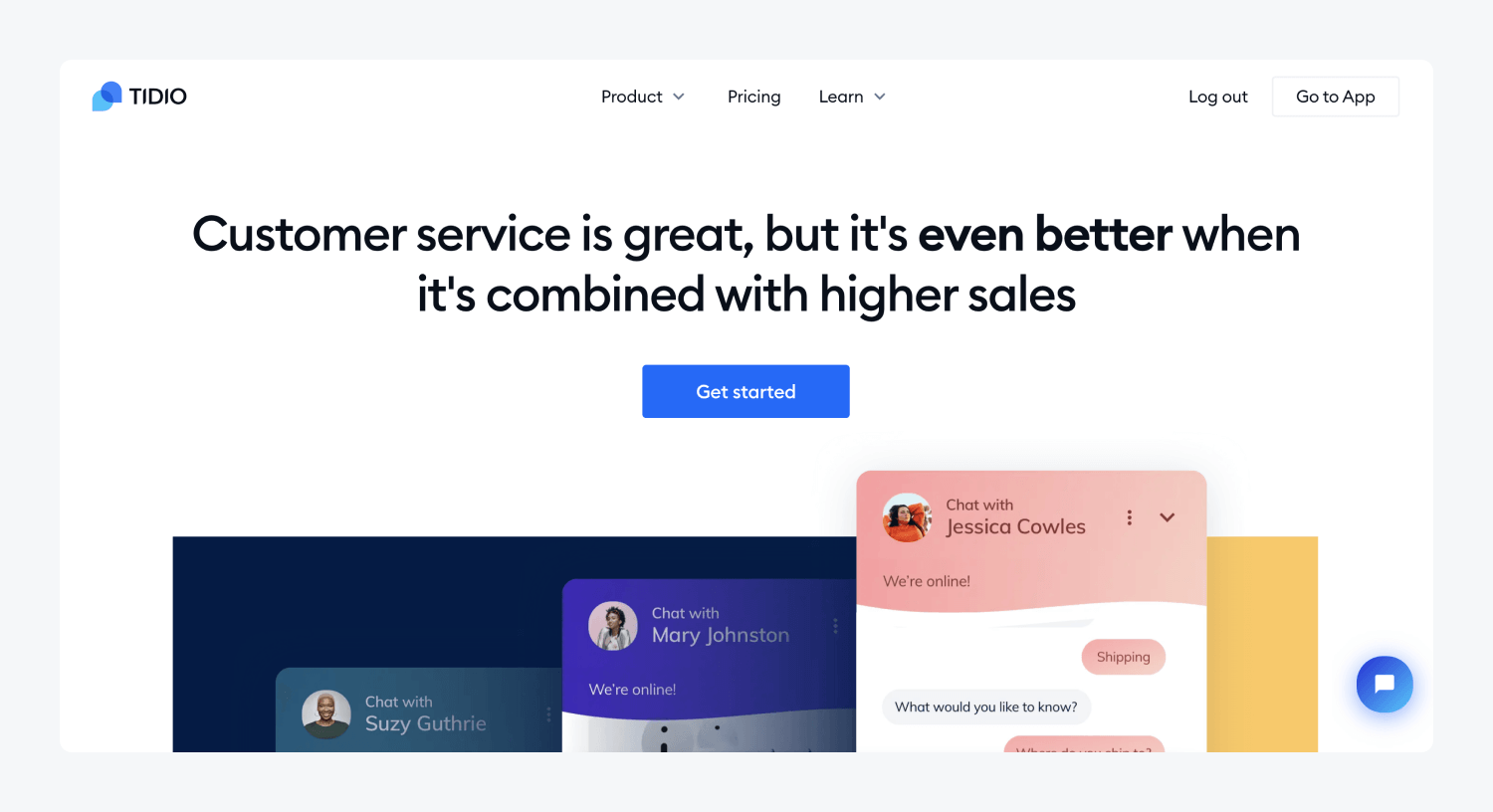
Genesys DX
Genesys DX uses AI-powered features to revolutionize customer engagement. The platform includes AI chatbots and proactive conversational AI across multiple channels, enabling quick issue resolution through advanced chat experiences.
LiveChat
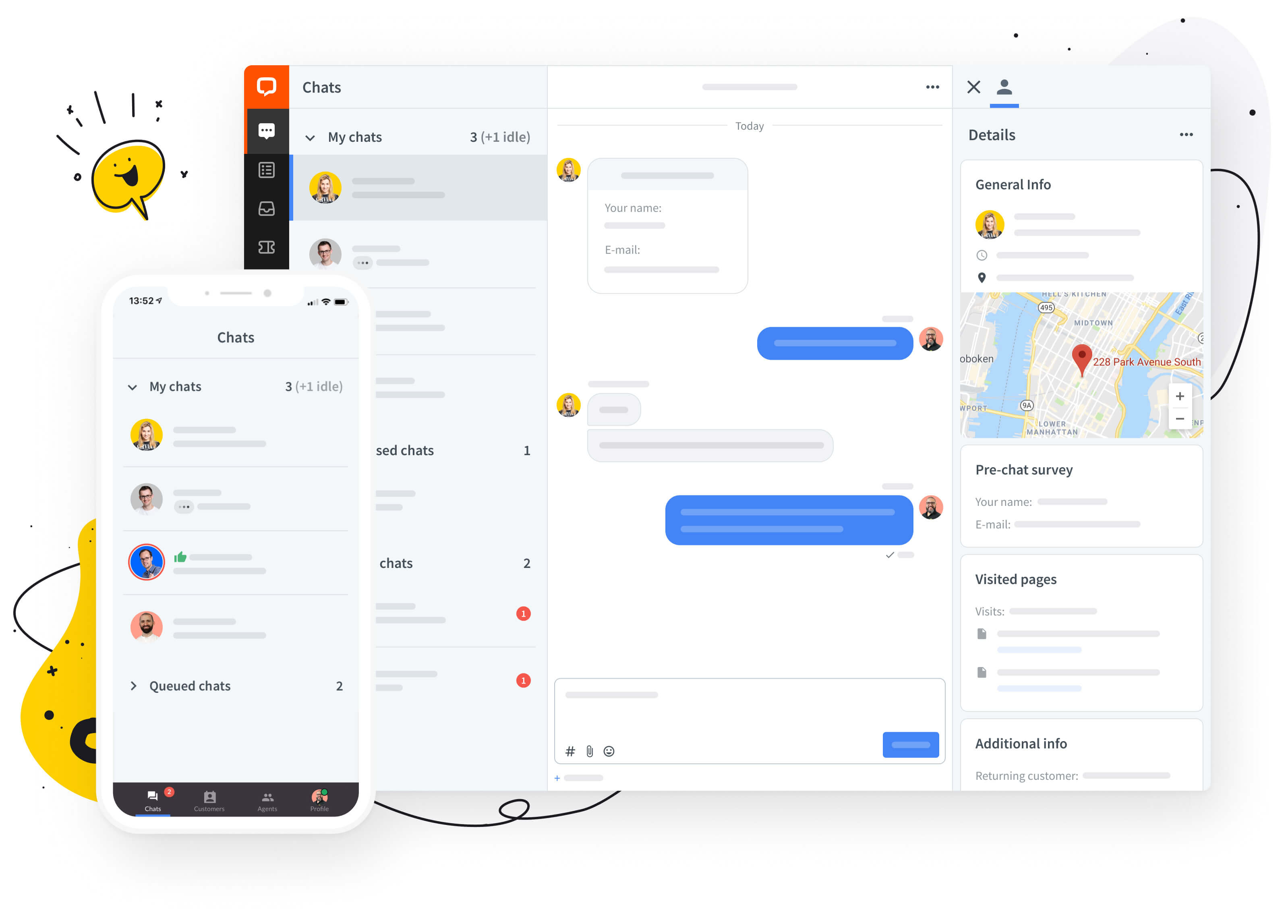
LiveChat supports customer service, sales, and marketing teams through live chat functionality. The platform handles conversations from Apple Messages, WhatsApp, SMS, and other channels, making it easy to engage website visitors proactively.
Best consumer-oriented chat platforms
You’re probably using at least one of these chat platforms in your everyday life. These chat apps allow all of us to get in touch with their friends and family. These apps differ in functionalities but also in their approach to securing their users’ communication.
Read on to find out what makes these popular chat apps stand out from the rest.
WhatsApp probably doesn’t need a lot of introduction. Since it’s the most used instant messaging app in the world, chances are you already use it.
While encrypted, it shouldn't be used for team chat without additional security measures, as businesses need extra protection for communication.
➡️ Read our quick guide for secure messaging and learn if WhatsApp is secure enough for businesses.
Telegram
Telegram is a cloud-based group chat platform with over 500 million monthly active users. Unlike WhatsApp, it stores media in the cloud rather than on devices, enabling larger file exchanges. Telegram offers enhanced security measures including secret chats and self-destruct messages.
Threema
Threema deserves recognition for its strong privacy focus. This highly secure platform doesn't collect user data and doesn't require phone numbers for registration. It works for both private communication and secure collaboration tools for workplace use.
Signal
Signal is renowned for secure communication. This nonprofit platform offers texting, voice messages, and video/voice calls while preventing third-party eavesdropping. It's free to use and provides exceptional security for privacy-minded users.
Facebook Messenger
Facebook Messenger remains popular, second only to WhatsApp and WeChat in user numbers. It allows messaging without phone numbers but requires more bandwidth and configuration. Messenger shares metadata with Meta, making it less secure for privacy-conscious users.
What makes the best chat platforms?
Whether selecting chat apps for team collaboration, customer support, or personal use, certain universal criteria ensure optimal performance:
- User friendliness: Intuitive design is crucial for adoption. The more user-friendly the platform, the higher the likelihood of consistent use by team members and colleagues.
- Uptime and reliability: Business operations depend on reliable communication tools. Uptime and availability directly influence customer success and daily operations. Choose vendors with proven reliability.
- Multiple communication methods: Modern users expect more than text messaging. Essential features include voice messages, video calls, image sharing, and GIF support. Without these capabilities, you'll likely need complementary solutions.
- Security: Data breaches occur daily, requiring extra precautions to protect conversations. This is especially critical when communicating with customers or exchanging business data. Organizations handling sensitive information should consider encrypted messaging solutions.
- Flexibility and scalability: Business chat platforms must adapt as organizations grow. At some point, you may need to expand users, integrate with other applications, or customize functionality. Flexibility and scalability are essential for long-term success.
How to choose your chat platform
The Digital Markets Act from the EU requires large messaging services to enable interoperability. This means you can choose platforms based on your preferences rather than being limited by others' choices. Even if you prefer Signal while a friend uses WhatsApp, you'll be able to message each other.
This will also impact workplace communication, making it easier for employees to connect with external partners and vendors. Rocket.Chat already enables this through federation capabilities while maintaining high security standards for organizations handling sensitive data.
Selection criteria to prioritize:
- Security and compliance requirements
- User experience and adoption potential
- Integration capabilities with existing tools
- Scalability for future growth
- Total cost of ownership
For mission-critical communications, organizations should evaluate platforms that support out-of-band communication and align with frameworks like the NIST cybersecurity framework.
Industry-specific considerations:
Government and defense: Organizations requiring government chat solutions should prioritize platforms supporting air-gapped collaboration and defense communication systems. Military organizations need military messaging and military chat solutions that meet stringent security requirements.
Federal and state agencies: Government messaging apps must support government communication protocols and compliance standards.
DevOps teams: Technical teams benefit from ChatOps tools that integrate with development workflows.
Distributed teams: Organizations with remote work tools should consider platforms supporting asynchronous messaging for teams across time zones.
Contact Rocket.Chat's sales team to discover how our platform meets security and user-friendliness requirements for your organization.
Frequently asked questions about chat platforms
What are chat platforms?
Chat platforms are software applications that enable real-time communication through messaging, voice calls, and video conferencing. They serve different purposes including workplace collaboration, customer support, and personal communication. Modern chat platforms offer features like file sharing, screen sharing, integrations, and security controls.
What is the best chat platform for business?
The best chat platform for business depends on your organization's specific needs. Rocket.Chat excels for organizations prioritizing security, customization, and compliance. Slack works well for teams seeking widespread adoption. Evaluate platforms based on security requirements, scalability, integration capabilities, and total cost of ownership.
What are the most popular chat platforms?
The most popular chat platforms globally include WhatsApp, Facebook Messenger, and WeChat for personal use. For business communication, Slack, Microsoft Teams, and Rocket.Chat lead the market. Customer support platforms like Intercom, Zendesk, and Freshchat dominate the customer service category.
What is the most secure chat platform?
The most secure chat platforms offer end-to-end encryption, on-premises deployment options, and compliance certifications. Signal and Threema provide exceptional security for personal use. For business, Rocket.Chat offers enterprise-grade security with encryption, data sovereignty, and compliance support for HIPAA, GDPR, and other regulations.
Which chat platform is best for remote teams?
Remote teams benefit from platforms offering video conferencing, screen sharing, file collaboration, and asynchronous messaging. Rocket.Chat, Slack, and Microsoft Teams all support remote work effectively. Choose platforms that integrate with your existing tools and provide reliable uptime for distributed teams.
What chat platform do most companies use?
Most companies use Slack or Microsoft Teams for internal communication. However, many organizations are adopting Rocket.Chat for its superior security, customization options, and lower total cost of ownership. Government agencies and regulated industries often prefer Rocket.Chat for its compliance capabilities and deployment flexibility.
Are free chat platforms secure for business use?
Free chat platforms often lack enterprise-grade security features and may monetize user data. Consumer platforms like WhatsApp are encrypted but don't provide the administrative controls, compliance features, or data sovereignty needed for business use. Organizations should invest in business-grade platforms with appropriate security certifications.
What is the difference between chat platforms and messaging apps?
Chat platforms typically refer to business or team collaboration tools with features like channels, integrations, and administrative controls. Messaging apps usually mean consumer-focused tools for personal communication. However, the terms are increasingly used interchangeably as platforms serve multiple purposes.
Frequently asked questions about <anything>
chat platforms
What is the best chat platform?
What is the most popular chat app?
What is the most private chat platform?
What platform is the best for group chats?


- Digital sovereignty
- Federation capabilities
- Scalable and white-labeled


- Highly scalable and secure
- Full patient conversation history
- HIPAA-ready

for mission-critical operations
- On-premise and air-gapped ready
- Full control over sensitive data
- Secure cross-agency collaboration
%201.svg)

- Open source code
- Highly secure and scalable
- Unmatched flexibility


- End-to-end encryption
- Cloud or on-prem deployment
- Supports compliance with HIPAA, GDPR, FINRA, and more


- Supports compliance with HIPAA, GDPR, FINRA, and more
- Highly secure and flexible
- On-prem or cloud deployment



.avif)


